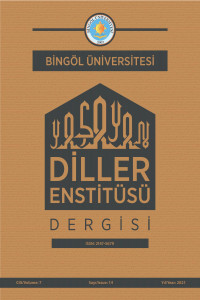Search of Zazaki Speaking Individuals For Identity
This study is on the identity construction process of young generations who speak Zazaki. Firstly, it is elaborated why this search for identity is more common amongst the young generations. Later, some primary information regarding the reasons for the fact that the identity and sense of belonging of young people who speak Zaza language divided is presented. Function of the language on the identity construction process is discussed. The focus of this study is: politicization of the adopted identity in this identity construction process, sense of discomfort that young people have when identified with identities other than the adopted one, the effects of young generation on previous generations in this process of identity seeking, the attitude of the government towards young people in this issue, determination of the tendencies of young individuals based on this seeking within this process.
Anahtar Kelimeler:
Zazas, sense of belonging, youth, identity seek, Zaza youth
___
- Arakelova, Victoria. “The Zaza People as a New Ethno-Political Factor in the Region”, Brill, 2010.
- Başbuğ, Hayri. “İki Türk Boyu; Zaza ve Kurmanclar”, Türk Kültürünü Araştırma Enstitüsü, Ankara, 1998.
- Bilgin, Nuri. “Kimlik İnşası”, AşinA Kitaplar, İzmir, 2007.
- Bostancı, Naci. “Modernizm ve Milliyetçilik”, Türkiye Günlüğü’”, Ankara, 1998.
- Keskin, Mesut. “Zazaca Üzerine Notlar”, İletişim Yayınları, İstanbul, Mayıs 2010.
- Çağlayan, Ercan. “Zazalar, Tarih, Kültür ve Kimlik”, İstanbul Bilgi Üniversitesi Yayınları, 2016.
- Çem, Manzur. “Kırmancca (Zazaca) Konuşan Kürtler ve 20. Yüzyıl Direnişlerinde Rolleri” http://www.zazaki.de/turkce/makaleler/zazacauzerinenotlar.pdf , May 26, 2016.
- Demirbağ, Mehmet Ali. “Zenginliğe Sahip Çıkmak Zazalar”, Turgut Özal Uluslararası Ekonomi ve Siyaset Kongresi II:Küresel Değişim ve Demokratikleşme, Ed. Selma Kartepe vd.,Malatya İnönü Üniversitesi, 2012.
- François, Georgeon. “May the Concept of Generation Be a Key Concept in Regards with the Transition from Ottoman Empire to Kemalist Turkey”, in Ferdan Ergut & Ayşen Uysal. ‘’Tarihsel Sosyoloji’’, Dipnot Yayınevi, 2007.
- Wyn, Johanna & White, Rob,’’ Chapter1: The Concept of Youth’’ in Rethinking Youth, London, Thousand Oaks, New Delhi: Sage Publication,1997.
- Karpat, Kemal, H. “Osmanlı’dan Günümüze Ortadoğu’da Millet, Milliyet, Milliyetçilik”, Timaş Yayınları, İstanbul.
- Malmîsanij, Mehmet. “Kırd, Kırmanci, Dımıli ve Zaza Kürtleri”, Deng Yayınları, 1996.
- Mead, Margaret. ”Chapter:3 The Future. Prefigurative Cultures and Unkown Children”, Culture and Commitments: A Study of the Generation Gap, Garden City, New York: Natural History Press/ Doubleday & Company, Inc.
- Varol, Murat. “Etnik Yaklaşımlar Bağlamında Zaza Kimliği”, Kimlik, Kültür ve Değişim Sürecinde Osmanlıdan Günümüze Kürtler Uluslar Arası Sempozyumu, Bingöl Üniversitesi Yayınları, 2013.
- Yanmış, M. Kahraman. “Gençlerin Dini ve Etnik Kimlik Algısı: Diyarbakır Örneği”, Akademik İncelemeler Dergisi, 2013.
- ISSN: 2147-5679
- Yayın Aralığı: Yılda 2 Sayı
- Başlangıç: 2015
- Yayıncı: Bingöl Üniversitesi
Sayıdaki Diğer Makaleler
داشۆرین لە نێوان شێخ رەزا و ئیرەج میرزادا
Têveranayışê Tıkê Vateyê Verênan ê Zazaki u Kurmancki
Search of Zazaki Speaking Individuals For Identity
Muaz Yakup Muhammed Ronî El-Meranî
Risteyên Peywendiyê û Peyvrêziya Wan (Devoka Mêrdînê)
Ortak Atasözlerinin Hikâyeleri: Farsî-Kurmancî-Zazakî -2-
Sê Tezên Mastera Kurdî Yên Ku Li Zanîngehên Tirkiyeyê Hatine Amadekirin -1-
